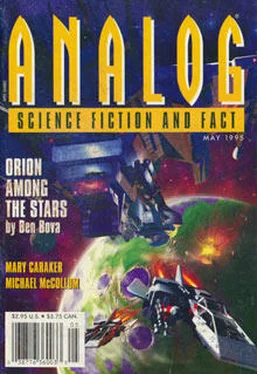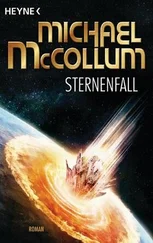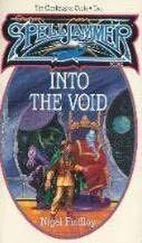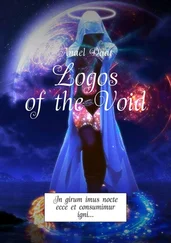Michael McCollum - The Void
Здесь есть возможность читать онлайн «Michael McCollum - The Void» весь текст электронной книги совершенно бесплатно (целиком полную версию без сокращений). В некоторых случаях можно слушать аудио, скачать через торрент в формате fb2 и присутствует краткое содержание. Год выпуска: 1995, Издательство: Dell Magazines, Жанр: Фантастика и фэнтези, на английском языке. Описание произведения, (предисловие) а так же отзывы посетителей доступны на портале библиотеки ЛибКат.
- Название:The Void
- Автор:
- Издательство:Dell Magazines
- Жанр:
- Год:1995
- ISBN:нет данных
- Рейтинг книги:5 / 5. Голосов: 1
-
Избранное:Добавить в избранное
- Отзывы:
-
Ваша оценка:
- 100
- 1
- 2
- 3
- 4
- 5
The Void: краткое содержание, описание и аннотация
Предлагаем к чтению аннотацию, описание, краткое содержание или предисловие (зависит от того, что написал сам автор книги «The Void»). Если вы не нашли необходимую информацию о книге — напишите в комментариях, мы постараемся отыскать её.
The Void — читать онлайн бесплатно полную книгу (весь текст) целиком
Ниже представлен текст книги, разбитый по страницам. Система сохранения места последней прочитанной страницы, позволяет с удобством читать онлайн бесплатно книгу «The Void», без необходимости каждый раз заново искать на чём Вы остановились. Поставьте закладку, и сможете в любой момент перейти на страницу, на которой закончили чтение.
Интервал:
Закладка:
After long seconds, Vannick cleared his throat and asked, “If you were truly interested in the long term strategic outlook, you would call off your attack.”
“Why is that?”
There was a brief struggle on his face as a variety of emotions raged within him. Finally, he said, “Never mind. I suppose that you want us to track the guard’s ships for you rather than vice versa.”
Tessa Hallowell shook her head. “No, my orders are to evacuate your people and then deny the use of this observatory to the enemy.”
“Deny how?”
“I am to vaporize this habitat and destroy as much as possible of the sensor array before returning to the Galaxy.”
For an instant she worried that he would have a heart attack. The already pale face turned ashen and his whole body shuddered as though stricken. When finally he regained the use of his voice, the elderly astronomer croaked, “You can’t!”
“I can sir, and I will. I have my orders.”
“What if I give you my solemn word as to our neutrality in the coming war?”
“Not good enough.”
“We’ll give guarantees. You can rig a bomb to blow us all up at the first hint we’ve betrayed you.”
“The first hint will come when the Galactic Guard slags down fleet headquarters. No, Professor, I’m sorry. This observatory will be destroyed.”
Vannick hesitated for long seconds, then sighed heavily. When he spoke, it was with the air of a man who has struggled with his conscience and come to a difficult decision. “Before you destroy the observatory, Captain, there is something you must see. I think you will agree that it places all of this in a different light.
“A very different light, indeed!”
Without waiting for her answer, Vannick slipped his restraint and clambered across the desktop like a monkey at feeding time. She considered having Cochrane halt him, but decided that the quicker whatever game he was playing was over, the quicker they could begin the evacuation. Instead of ordering Vannick stopped, Tessa ordered the sergeant major and his guards to follow them. The small party swarmed along the circumferential corridor, then turned upward into a radial corridor that led to the interior of the habitat.
Within a few dozen meters, she found herself floating in a large spherical space. A platform with several workstations hovered at the sphere’s center, held there by some invisible means. Vannick immediately kicked off and floated the ten meters to the platform. Tessa ordered the guards to station themselves at the entrance hatch and followed him. She anchored herself beside the astronomer, who was powering up various controls.
“What now?”
“Watch,” he said, cryptically.
A moment later, she was no longer inside the featureless gray sphere. Instead, she hovered in deep space with the Galaxy spread out below her and the infinite Universe above. The view was the same as she’d had from her gig, except the stars were a bright kaleidoscope of colors that bore little resemblance to the pale radiance they exhibited outside. Overhead and behind them were dim patches of colored light that represented the far galaxies.
“A holographic display from the tachyon array,” the astronomer explained. “You are seeing the Galaxy not in visible light, but rather, by the superlight particles that stream out of the interiors of stars.”
“Why the false colors?”
“They denote particle energy. Red is for the slowest tachyons, blue for the fastest.”
“I thought tachyon velocity was infinite.”
“Close enough to it that it doesn’t matter for most purposes,” Vannick agreed. “Even the slowest can cross the known Universe in less than an hour. But if they were infinitely fast, there would be no way to detect them. They would appear to be everywhere at once, with no means of telling their direction. As it is, we require more computer power than most planets to interpret the readings we receive from the array.”
“Surely this isn’t what you brought me here to see?”
“Right. Let’s take a little journey.” He passed his open palm over one of the controls as he spoke a series of coordinates. Suddenly the sky changed around them.
“The Galaxy is only one of billions, you know. Galaxies are arranged in gravitationally bound groups called clusters, and clusters of galaxies are themselves arranged in superclusters, and so on virtually ad infinitum. ”
“I excelled in astronomy at school, Professor,” she said acidly, not knowing where he was going with all of this. She watched while the Universe rotated and the Galaxy, which had been below them, began to shrink precipitously. In less than a second, the Milky Way was just another hazy patch of light on the ebon vault of the viewdome. Other patches streamed past her until one particular patch began to grow. As it grew, the smudge of light split and became numerous tiny smudges, which in turn grew until each developed a tiny shape of its own. When the expansion halted, it was as though some careless giant had sown the sky with hundreds of tiny spirals, each oriented at random.
“This is the Virgo cluster of galaxies, which is the gravitational center of our own local supercluster. It’s about 70 million light-years from here. It contains some 250 large galaxies and about 1,000 smaller ones.”
Tessa felt a momentary pang as her mind struggled with the scale of the Universe, something for which the human brain is singularly unsuited. After seven centuries of star travel, humanity had visited fewer than 0.1 percent of the suns in the home Galaxy. As for the Andromeda Galaxy, humanity’s closest neighbor, it remained unattainably distant. On the viewdome stretched hundreds of galaxies, many far larger than the Milky Way, all crammed into a portion of the sky that could be covered by a thumbnail held at arm’s length.
Nor was this particular galactic cluster unique. There were galactic clusters everywhere one looked in the sky, so many that the astronomers barely paid attention to anything as small as a mere galaxy. The entire fifteen billion light-year diameter of the Universe was so filled with galaxies that on a large scale they had the appearance of being the foam flung skyward by some overpowering violent surf. There were more galaxies in the sky than grains of sand on a beach. It was enough to give even a starship captain a feeling of inferiority.
The Virgo cluster was so large, the number of galaxies within it so numerous, that it took a dozen seconds for her to notice the small violet sphere in the crosshairs of the viewdome’s coordinate display.
“What is that?” she asked, wondering if it were part of the display.
“That, Captain Hallowell,” the astronomer said heavily, “is the reason why the Hegemony must not secede from the Communion of Humanity. More importantly, it is the reason why you must not destroy this observatory!”
“What is it?”
“We call it The Void. It is absolutely pure vacuum so far as our instruments can determine. No stars, no planets, not even cosmic gas or dust.”
“How come we can see it then?”
“For reasons that I will explain, the void possesses an event horizon. Any normal matter that crosses that event horizon is converted into pure tachyon energy.”
“Event horizon? Like a black hole?”
“The analogy is close, but The Void is not caused by gravitational curvature like a black hole. In fact, we don’t know what causes it. All we know is that it appears to be a sinkhole into the tachyon universe.”
“I’m afraid I didn’t get that far in astronomy class, Professor. What, exactly, is a ‘tachyon universe?’ ”
“The theory is a very old one. It was first postulated more than a thousand years ago and has been generally accepted since the invention of ftl travel. It was back in the twentieth century that people first realized the true nature of the Universe, namely that it began in a titanic explosion. Our ancestors somewhat whimsically dubbed this colossal event ‘The Big Bang.’ ”
Читать дальшеИнтервал:
Закладка:
Похожие книги на «The Void»
Представляем Вашему вниманию похожие книги на «The Void» списком для выбора. Мы отобрали схожую по названию и смыслу литературу в надежде предоставить читателям больше вариантов отыскать новые, интересные, ещё непрочитанные произведения.
Обсуждение, отзывы о книге «The Void» и просто собственные мнения читателей. Оставьте ваши комментарии, напишите, что Вы думаете о произведении, его смысле или главных героях. Укажите что конкретно понравилось, а что нет, и почему Вы так считаете.












